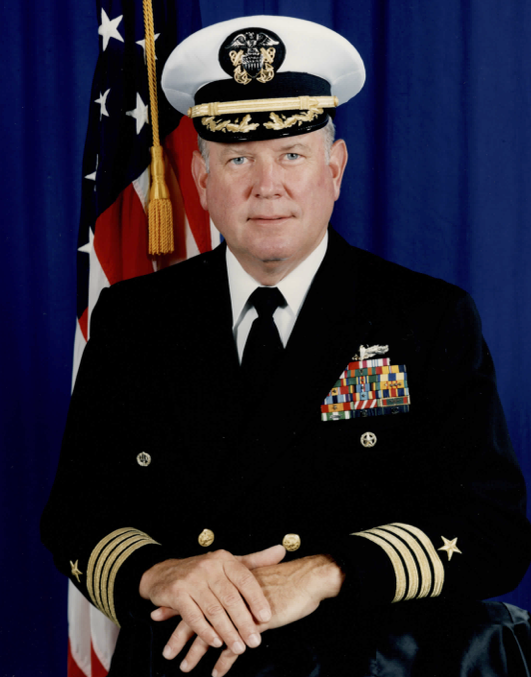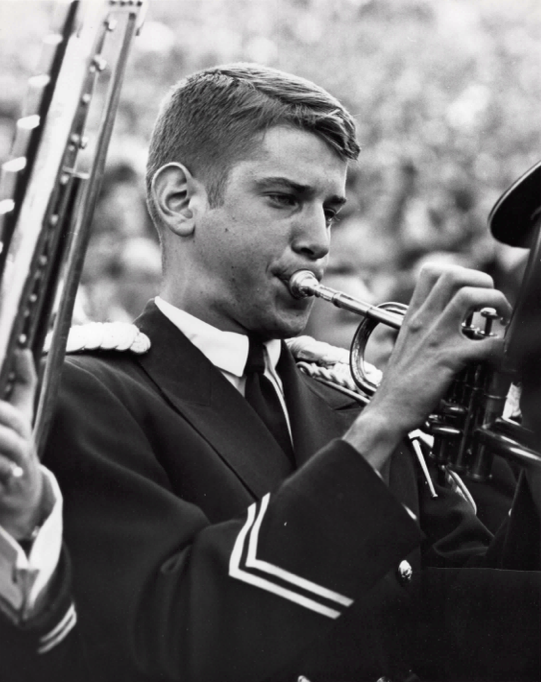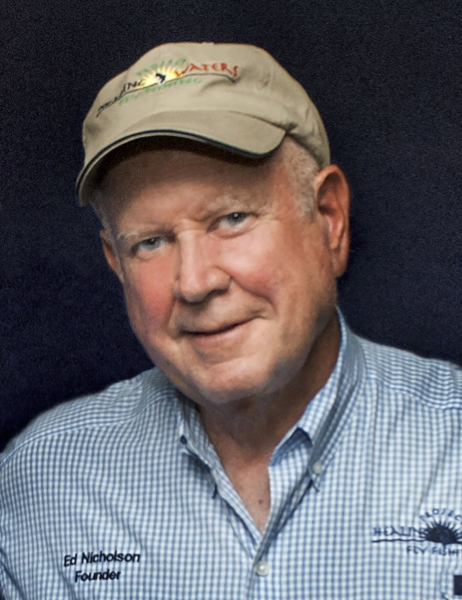“Whether a student continues with a career in music or not, the discipline required to perform will serve them in any capacity. The love of music opens doors with other like-minded individuals and will be a constant source of pleasure throughout your life.”
Retired Captain Ed Nicholson, BA 1964, was one of only two undergraduate instrumental musicians studying to be a band director during his time at UNC. Though his career in music education never got started after a two-year obligation to the Navy turned into a 30-year career, Captain Nicholson looks back fondly on his time as a music major at UNC and acknowledges the life lessons that contributed to his career successes.
We caught up with Captain Nicholson to learn more about his time at Carolina and how his love for music has followed him throughout his career in the Navy and beyond.
UNC Music: What was your Carolina experience like?
Captain Ed Nicholson: Arriving from my hometown in Ohio, in 1960, I knew no one at UNC. But in short order, I made many friends, especially within the music department, and learned that I was one of but two instrumentalists studying music to become a band director. I was still under the influence of my charismatic high school band director, a former Marine, who had fought his way across the Pacific in WWII. He, too, was a trumpet player, like I was. As the only instrumentalist majoring in the trumpet, I was playing all the time – in Marching Band, Wind Ensemble, Brass Ensemble, Concert Band, and any other gigs that came up where a trumpet player was needed. I still wonder how I managed my academic load. But it was all wonderful because I loved to play.
 Concurrently, I had decided to join the Naval ROTC Program at UNC and was in the Drum and Bugle Corps there. At the end of my 4 years, and after student teaching at Durham High School, I took stock of my future. I came to the conclusion that my competence as a trumpet player would not allow me to make a living, and the experience of student teaching left me wondering if I wanted to continue in the field of education.
Concurrently, I had decided to join the Naval ROTC Program at UNC and was in the Drum and Bugle Corps there. At the end of my 4 years, and after student teaching at Durham High School, I took stock of my future. I came to the conclusion that my competence as a trumpet player would not allow me to make a living, and the experience of student teaching left me wondering if I wanted to continue in the field of education.
When I was commissioned as an Ensign, I had two years of obligated service for the Navy, and I felt it would afford me the time to decide what I wanted to do with the rest of my life. After reporting to my ship in Norfolk, it did not take me long to realize that the Navy would be my career choice.
UNC Music: Tell us a little bit about your career.
Captain Nicholson: After reporting to the ship, I had thought my music career was in abeyance. The Commanding Officer, however, had other thoughts.
During a Welcome Aboard interview with him, he immediately saw me as a resource for creating a band aboard this large ship. I was caught flatfooted and offered many excuses for why that would be difficult – who were the players? the instruments? and all the other elements of creating a band. He brushed all my concerns aside and told me to make it happen. He instructed me to work with the Executive Officer, and since we were going to New York City for a port call, he would provide me the opportunity to buy whatever equipment I needed out of the Welfare and Rec Fund.
I found myself at Manny’s in New York City, purchasing all manner of instruments (I by then had identified those among the crew who would be participating and the instruments they played), music, stands – the whole works. As soon as we got organized, we started practicing and in short order, we had a band.
Our first opportunity to play came when we were refueling at sea alongside an aircraft carrier, and the band, hidden behind a bulkhead, stood up and started playing, drowning out the band on the other ship. The Captain was ecstatic.
My band directing days ended when that Captain left the ship. I then proceeded on a 30-year career, with time in Vietnam, traveling the Seven Seas, and ultimately commanding two combatants (a destroyer and a frigate), and two large shore activities.
Interspersed during those years, I attended the Naval Post Graduate School, graduating with a degree in Chemistry, and obtained a Masters in Strategic Studies from the Naval War College in Newport, Rhode Island. There were short periods during that 30-year career when I played my trumpet ashore.
After leaving the Navy, I worked for a defense contractor for 10 years and then, most recently founded a non-profit, Project Healing Waters Fly Fishing, to help wounded and disabled Veterans find a better life through the benefits of fly fishing, a long-time passion of mine, now in its 20th year.
Over the years, my abiding fondness for my time at Carolina, and the music department experience, has never diminished. They provided an irreplaceable and valuable groundwork for success in the years after my departure.
UNC Music: What is your favorite memory from your time in the military?
Captain Nicholson: When I was stationed aboard a ship in New York City, where I met my wife, during the 1976 Fleet Week Bicentennial and Tall Ships celebrations.
UNC Music: What role did music play in your life outside of your military career?
Captain Nicholson: I previously mentioned playing several times when stationed ashore. Some of the most notable occasions were at the Naval Post Graduate School, in a Pit Orchestra organized for the performance of several Broadway musicals, including Guys and Dolls and South Pacific. I also played Taps for a burial at sea.
Outside my military career, studying music at Carolina has given me an abiding love of the best of music – in a wide variety of genres including classical, opera, jazz, bluegrass, and country – and enriched my life enormously.
UNC Music: What advice do you have for current music students?
Captain Nicholson: Whether a student continues with a career in music or not, the discipline required to perform will serve them in any capacity. Parenthetically, there is no such thing as a sloppy musical performer. The love of music opens doors with other like-minded individuals and will be a constant source of pleasure throughout your life. For example, 60 years after I graduated, I find my wife and I in front of our TV, enjoying streaming performances of the Berlin Philharmonic and their digital library.
You will never forget good music, for as long as you live.


